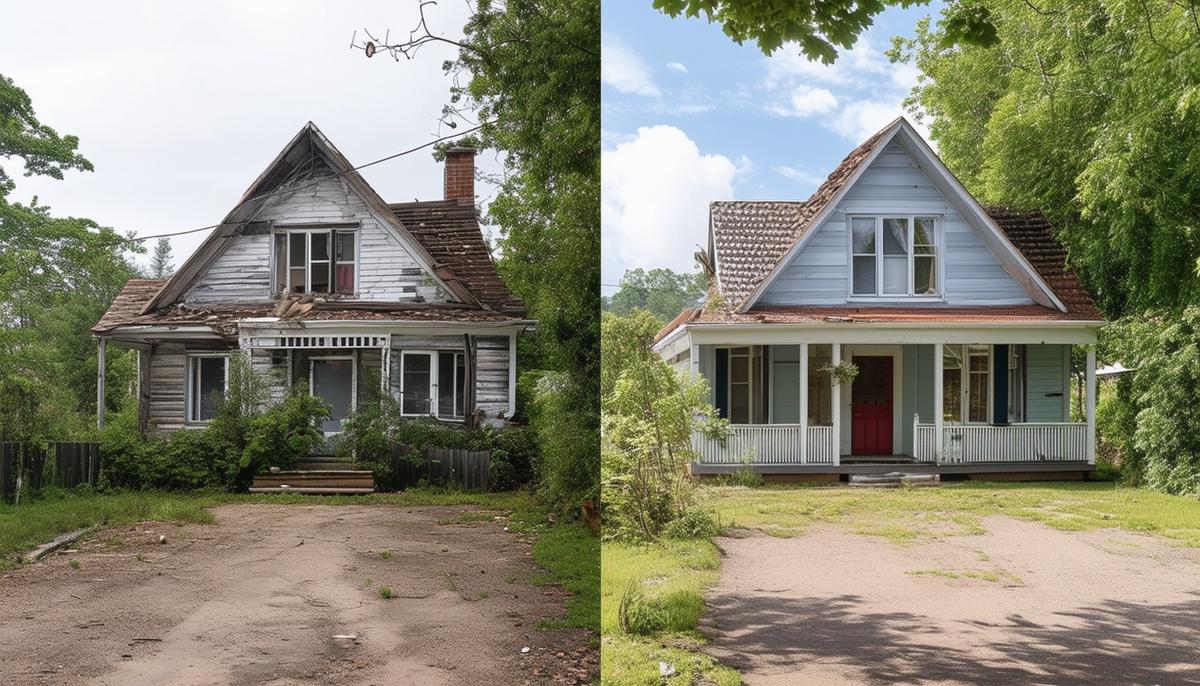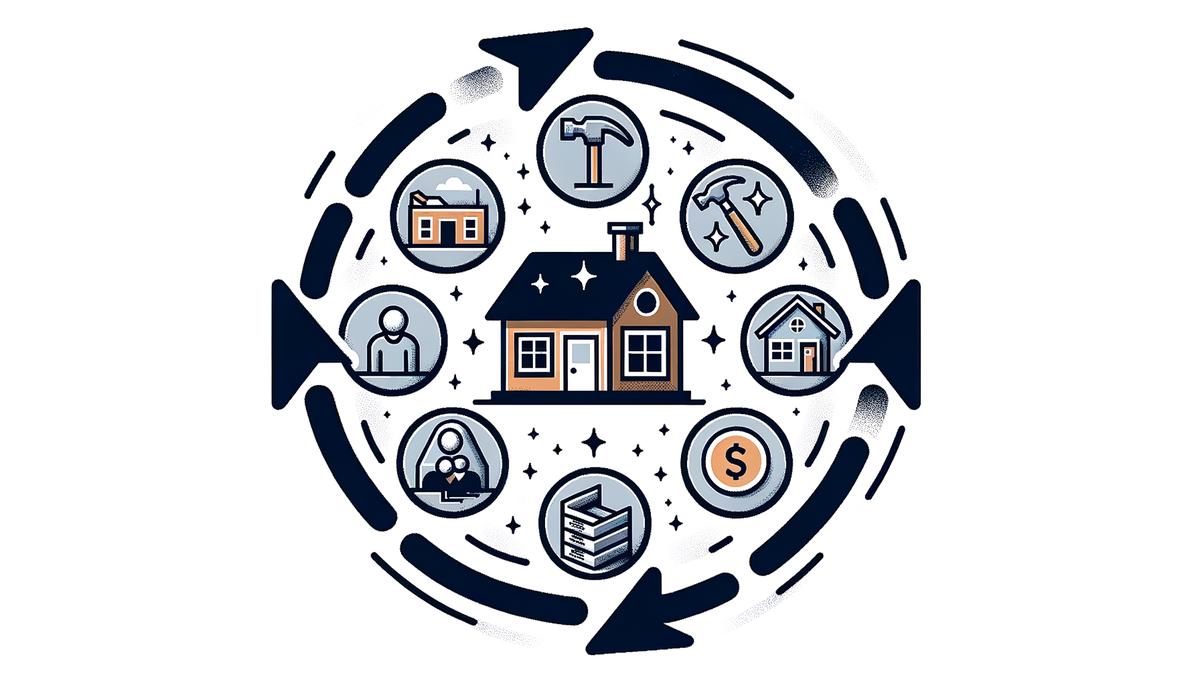Owning a home is more than just a financial investment; it's an adventure filled with learning and growth. Whether you're buying your first property or adding to your portfolio, the journey can be both exciting and rewarding. From understanding different investment strategies to managing properties, there's always something new to discover in real estate.
1. Buy and Hold
Ready to make some money while you sleep? Welcome to "Buy and Hold" real estate investing! This strategy involves purchasing a property and holding onto it for the long haul, typically 10 years or more. Over this time, you collect rent and watch the property value appreciate. The passive income is appealing, and the goal is long-term wealth building rather than quick profits.
Property values tend to rise over time, which is what appreciation is all about. Your tenants help cover mortgage costs and other expenses. Patience is key with this strategy; it's not about fancy renovations or flipping for a quick profit.
Keep in mind that real estate's passive income does require some active management. You might get calls about maintenance issues, so it's important to screen tenants thoroughly and consider hiring a reliable property manager.
While markets can be unpredictable, property values generally trend upwards over time. Rental income can help you weather market fluctuations. To maximize success, choose properties in up-and-coming or stable areas with good schools, parks, and low crime rates.
Remember, "Buy and Hold" isn't about instant gratification; it's about building a future where real estate works for you.

2. House Hacking
House Hacking is a smart strategy for new real estate investors. Here's how it works: you buy a multifamily property, live in one unit, and rent out the others. This approach allows you to essentially live rent-free or even make a profit while building equity.
The rent you collect from tenants helps cover your mortgage—sometimes entirely. This means more money in your pocket for other investments or personal use. It's an excellent way to get started without a large initial investment. You can often leverage FHA or VA loans, which have low down payments.
Benefits of House Hacking:
- Secure a steady stream of income
- Build equity faster
- Significantly reduce housing costs
- Gain hands-on experience in property management
Of course, there are challenges. Living close to your tenants might lead to occasional disputes or noise complaints. You'll also take on the role of part-time landlord, handling repairs and tenant issues. Many House Hackers eventually turn to property managers to handle these responsibilities.
This strategy is ideal for first-time investors or those looking to enter the real estate market. It provides hands-on experience in property management and tenant relations while securing your own living space and generating income.
Consider repeating this process with new properties every few years to build a diversified portfolio generating significant cash flow. House Hacking isn't just a strategy; it's a smart path to real estate success!

3. Flipping Properties
Flipping Properties is an exciting strategy in real estate investing. It involves finding undervalued properties, renovating them, and selling for a profit. Success in flipping requires a keen eye for potential and understanding market trends.
The process starts with finding the right property. Look for underpriced homes in desirable locations. Remember, location is crucial for a successful flip. Once you've found a property, the renovation begins. This is where you transform the fixer-upper into a desirable home. Think updated kitchens, modern bathrooms, and improved curb appeal.
Having a reliable team is essential. Contractors who understand your vision, stick to budgets, and meet deadlines are invaluable. Time management is critical in flipping, as holding costs can eat into your profits.
Key Considerations for Flipping:
- High upfront costs
- Market fluctuations
- Quick sale necessity
- Buyer preferences
- Local market trends
Knowledge of the market is crucial. Stay informed about buyer preferences, local trends, and average sale prices. Focus on up-and-coming areas for better returns with less competition. Establishing a relationship with a knowledgeable local realtor can be beneficial for finding deals and selling your renovated properties.
Flipping properties requires a blend of design flair, business acumen, and market understanding. It's about transforming spaces and creating value. With the right approach, flipping can be both profitable and satisfying.

4. Live-In Flip
The Live-In Flip strategy combines home ownership with investment potential. You buy a fixer-upper, move in, and gradually renovate it while living there. This approach allows you to take your time with renovations, spreading costs over a longer period.
The key advantage is sweat equity. By doing some of the work yourself, you increase the home's value without spending as much on labor. This hands-on approach not only saves money but also gives you valuable DIY skills.
"Living in the property for at least two out of the five years before selling offers a significant tax benefit. You can potentially avoid capital gains taxes on your profit—up to $250,000 for singles and $500,000 for married couples, thanks to the Section 121 Exclusion."
Of course, living in a work-in-progress has its challenges. It requires patience and adaptability. You'll need to balance your budget carefully, as unexpected issues can arise during renovations.
What makes a live-in flip special is the personal touch. You're creating a space that's not just an investment, but also your home. This dual purpose can lead to thoughtful, quality improvements that appeal to future buyers.
If you enjoy hands-on projects and have a vision for transforming spaces, a live-in flip could be an excellent way to build equity and potentially make a profit. It's a strategy that combines financial savvy with the satisfaction of creating your own living space.

5. BRRRR
The BRRRR method (Buy, Rehab, Rent, Refinance, Repeat) is a strategic approach to building a real estate portfolio. This five-step process allows investors to expand their holdings efficiently.
The BRRRR Process:
- Buy a property that needs work, typically at a lower price.
- Rehab it to increase its value.
- Rent the property to generate income.
- Refinance based on the property's new, higher value.
- Repeat the process with the cash from refinancing.
This method allows you to recycle your initial investment, potentially growing your portfolio without constantly injecting new personal funds. It's an effective way to build wealth through real estate over time.
However, each phase comes with its own challenges. Successful implementation requires careful planning, market knowledge, and the ability to manage renovations and tenants effectively.
The BRRRR method can be a powerful tool for building a cash-flowing portfolio while accumulating equity. It's a strategy that rewards patience, planning, and a willingness to learn from each cycle. With diligence and the right approach, BRRRR can help you steadily grow your real estate investments.

6. REITs
REITs: Real Estate for Everyone's Portfolio
Real Estate Investment Trusts (REITs) offer a clever way into property investment without the hands-on landlord responsibilities. With REITs, you can explore real estate while keeping your weekends free.
REITs allow you to buy shares in a portfolio of income-generating real estate assets—like shopping malls, office buildings, apartments, and data centers. These portfolios are managed by experts who know the market well. You get to enjoy regular dividend income and potential portfolio growth, all with a simple investment.
REITs resemble mutual funds in the real estate sector. You enjoy a piece of a larger, more diverse property portfolio, spreading your risk across numerous assets. Your investments are diversified across different properties, regions, and even sectors.
Key Advantages of REITs:
- High Liquidity: Unlike traditional real estate, you can buy and sell REIT shares just like stocks.
- Regular Income: REITs must legally distribute at least 90% of their taxable income to shareholders.
- Diversification: Spread risk across various properties and sectors.
- Professional Management: Experts handle property selection and management.
However, REITs have their drawbacks. They can be subject to stock market fluctuations, and the income is generally taxed as ordinary income, which might not be as tax-friendly as capital gains.
Despite these considerations, the advantages often outweigh the drawbacks for many investors. REITs offer the opportunity to invest in real estate without the headaches of direct property management.
"If you've dreamed of owning a slice of commercial or residential real estate but hesitated at the thought of maintenance, tenant management, or property taxes, REITs could be your solution. They allow you to become a real estate investor without the hands-on responsibilities."

7. Crowdfunding
Real Estate Crowdfunding allows you to invest in property projects without dealing with the day-to-day responsibilities of property ownership. This modern approach lets you pool your money with other investors to collectively fund commercial or residential projects.
Crowdfunding platforms serve as your gateway to diverse real estate opportunities. From new apartment complexes to commercial spaces, these platforms provide access to investments typically beyond an individual investor's reach.
How It Works:
- Platforms evaluate and select promising projects
- Investors choose projects and invest their desired amount
- Platform manages legal details and oversees the investment
- Investors receive returns based on project performance
Key Advantage: Accessibility. Unlike traditional real estate investments, you don't need to invest large sums of money. A modest investment can give you access to multiple projects, helping to spread your risk and potentially boost returns.
Important Considerations:
- Returns aren't guaranteed
- Projects may take longer than anticipated to yield profits
- Limited liquidity – your money may be locked up for extended periods
Despite these considerations, real estate crowdfunding offers an opportunity to invest in high-stakes projects without needing a large amount of capital. It allows you to invest in properties usually reserved for institutional investors, making it an interesting option for those looking to diversify their investment portfolio.

8. Wholesaling
Wholesaling is a fast-paced strategy in real estate investing. As a wholesaler, you act as an intermediary between distressed property owners and eager buyers, aiming to make a profit in the process.
The Wholesaling Process:
- Find undervalued properties (fixer-uppers, estate sales, quick-sale homes)
- Negotiate a deal and get the property under contract
- Sell the contract to another buyer for a profit
- Earn an assignment fee for your efforts
Key Advantage: Minimal capital investment. Since you're flipping contracts rather than properties, you don't need to deal with property management or renovation costs.
Essential Skills for Wholesaling:
- Strong negotiation abilities
- Network building (with agents, investors, contractors, buyers, sellers)
- Market trend awareness
- Patience and perseverance
Wholesaling offers flexibility and speed, allowing you to be more agile than traditional property flippers. This can be advantageous in fluctuating markets.
"Wholesaling offers a way to enter real estate investing with minimal risk and capital. It's centered around smart deal-making, strong networks, and the ability to identify undervalued properties."
With the right strategy and determination, wholesaling can be a profitable part of your real estate investment approach.

9. Private Lending
Private Lending offers a way to invest in real estate without directly managing properties. In this strategy, you provide loans to other investors or developers for their real estate ventures, earning interest income in return.
Key Features of Private Lending:
- Passive Income: Earn interest without direct property management
- Higher Returns: Often charge higher interest rates than traditional institutions
- Flexible Terms: Ability to adjust loan structures to suit both parties
- Secured Investment: Loans are typically secured by property liens
Important Considerations:
- Requires substantial capital to get started
- Due diligence is crucial – assess borrower creditworthiness and project viability
- Risk management is essential – secure loans with good collateral
- Consider diversifying across multiple loans and projects
While private lending can be less hands-on than direct property ownership, it's not entirely passive. You'll need to monitor your investments, collect payments, and potentially deal with late payments. Some investors choose to hire a servicing company to handle these tasks.
"Private lending offers a way to profit from real estate without the day-to-day responsibilities of property ownership. It allows you to leverage your financial resources to generate income while others handle the property management aspects."
However, it requires careful consideration, thorough due diligence, and effective risk management to be successful. Private lending can be a valuable addition to a diversified real estate investment portfolio for those with the necessary capital and risk tolerance.

10. Turnkey Properties
Ever considered real estate investing without the headaches of renovations or tenant management? Welcome to the world of Turnkey Properties. These are fully renovated homes or apartments ready for immediate rental, complete with property management services.
Turnkey properties offer a hassle-free approach to real estate investing. You purchase a property that's already in great condition and has a management team in place. This means you can start earning rental income quickly without worrying about repairs or finding tenants.
The main advantages of turnkey properties include:
- Immediate rental potential
- Professional property management
- Renovations already completed
- Often located in high-demand areas
However, these conveniences come at a price. Turnkey properties typically have a higher upfront cost compared to fixer-uppers. You're paying for the renovations, the management setup, and the peace of mind.
Before jumping in, it's crucial to:
- Research the property management company's reputation
- Understand the local rental market
- Ensure a thorough property inspection
Financing can sometimes be easier for turnkey properties due to their lower risk profile. Banks often view well-maintained properties with established rental histories favorably.
Turnkey investments are ideal for investors who value their time and prefer a more hands-off approach. If you'd rather focus on strategy than deal with day-to-day property issues, this could be the perfect fit for you.
"Turnkey properties offer convenience, but they're not entirely effortless. You'll still need to oversee the big picture and make important decisions."
For many, the trade-off of higher initial costs for lower time investment and potentially steadier returns is well worth it. In fact, a study by the National Association of Realtors found that 37% of investment property buyers chose turnkey properties in 20201.

Real estate offers numerous paths to financial success and personal fulfillment. By choosing the right strategy for you—whether it's Buy and Hold, House Hacking, or Turnkey Properties—you can build wealth while enjoying the process. Take that step confidently and let your passion for real estate guide you to a prosperous future.

